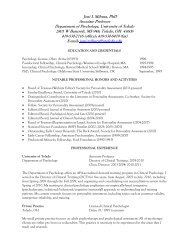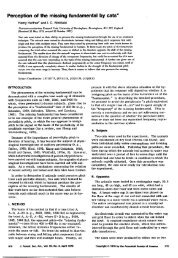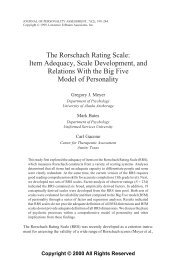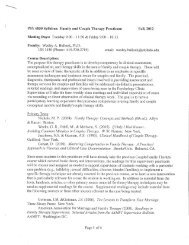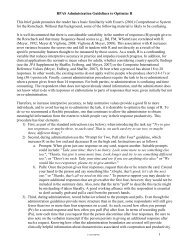Message from the Editor Inside This Issue A Tribute to Dr. Alice ...
Message from the Editor Inside This Issue A Tribute to Dr. Alice ...
Message from the Editor Inside This Issue A Tribute to Dr. Alice ...
You also want an ePaper? Increase the reach of your titles
YUMPU automatically turns print PDFs into web optimized ePapers that Google loves.
Volume 1, Number 2 • Spring 2012<br />
Continured <strong>from</strong> Page 5.<br />
humility <strong>to</strong> <strong>the</strong> extent <strong>to</strong> which anyone can<br />
really “know” anything. According <strong>to</strong> <strong>Dr</strong>.<br />
Heffner, part of being a successful scientist is<br />
realizing how much is unknown and which<br />
questions <strong>to</strong> ask about <strong>the</strong> unknown.<br />
Research and academic study are a large part<br />
of <strong>Dr</strong>. Heffner’s life, but she also has several<br />
interesting hobbies. More specifically, she<br />
describes herself as a master gardener. <strong>Dr</strong>.<br />
Heffner grows a variety of vegetables and<br />
also has several fruit trees <strong>from</strong> which she<br />
harvests apples, pears, peaches and plums.<br />
<strong>Dr</strong>. Heffner’s garden is so well developed<br />
that she rarely buys vegetables or fruit. To<br />
maximize <strong>the</strong> utility of her garden, <strong>Dr</strong>.<br />
Heffner often dries or cans extra fruit for<br />
later use. In addition <strong>to</strong> growing fruits and<br />
vegetables, <strong>Dr</strong>. Heffner has continued <strong>to</strong><br />
expand her homegrown production of food;<br />
she has more recently acquired seven hens<br />
and is quite excited about integrating <strong>the</strong>m<br />
in<strong>to</strong> her lifestyle.<br />
In<br />
addition <strong>to</strong><br />
being a master gardener,<br />
<strong>Dr</strong>. Heffner also practices karate. She began<br />
taking karate when she was 55 years old<br />
and currently holds a black belt. Although<br />
she has reached <strong>the</strong> highest level, she<br />
continues <strong>to</strong> practice karate regularly. <strong>Dr</strong>.<br />
Heffner says that gardening and karate have<br />
taught her quite a bit about life. Gardening<br />
fur<strong>the</strong>r reinforces <strong>Dr</strong>. Heffner’s belief that<br />
perseverance and resilience are important<br />
characteristics <strong>to</strong> maintain in life, and she<br />
states that karate has taught her that excuses<br />
are relatively unacceptable. In particular, she<br />
faces young males in <strong>the</strong> ring that may have<br />
Ask a Psychologist : Questions About Employment<br />
By Brittany Tenbarge, Graduate Student<br />
more<br />
agility or strength, but <strong>Dr</strong>.<br />
Heffner learns ways in which she can win<br />
despite <strong>the</strong>ir advantages. For instance, she<br />
makes sure <strong>to</strong> have <strong>the</strong>m dancing around<br />
her in order <strong>to</strong> reduce <strong>the</strong>ir energy instead of<br />
explicitly fighting against <strong>the</strong>m.<br />
Overall, <strong>Dr</strong>. Heffner serves as a great model<br />
for a faculty member who is devoted <strong>to</strong> her<br />
work and maintains high expectations, but<br />
has also developed a rich life outside <strong>the</strong> lab!<br />
Psychology is a popular college major. In our department alone, we have well over 500 undergraduate majors, 150 undergraduate<br />
minors and 40 graduate students. Below are a couple of <strong>the</strong> questions we get on a regular basis, and <strong>the</strong>y center around employment.<br />
In a <strong>to</strong>ugh economy like this one, it’s important <strong>to</strong> be knowledgeable and systematically plan for one’s future. It just might give you<br />
<strong>the</strong> competitive edge you need <strong>to</strong> land your next job!<br />
How can I find a job with an undergraduate degree in psychology?<br />
Finding a job in <strong>to</strong>day’s market can be challenging; however,<br />
<strong>the</strong> good news is that employers of all stripes, in areas<br />
such as human resource departments, want and need your<br />
communication and interpersonal skills; your ability <strong>to</strong><br />
collect, organize, analyze and interpret data; and, perhaps<br />
most importantly, your strong understanding of human<br />
behavior. The following are tips on how <strong>to</strong> find a job that fits<br />
your interests and talents:<br />
• Plan early. As early as your freshman year, meet with<br />
your academic adviser <strong>to</strong> discuss your career interests<br />
and options. Continue <strong>to</strong> hone your career choice by <strong>the</strong><br />
end of your sophomore year so that you have identified<br />
<strong>the</strong> unique constellation of knowledge, skills and<br />
characteristics you need <strong>to</strong> enter <strong>the</strong> career of your choice<br />
— and also have time <strong>to</strong> take <strong>the</strong> classes and engage in <strong>the</strong><br />
activities you will need by <strong>the</strong> time you graduate.<br />
• Assess yourself. Figure out who you are and what<br />
you want <strong>from</strong> a job. Consider your answers <strong>to</strong> <strong>the</strong>se<br />
questions: What are <strong>the</strong> 10 traits that describe you best?<br />
What working conditions must you have? How much<br />
money do you need <strong>to</strong> make? What are your long-term<br />
goals? What skills do you have and which do you most<br />
enjoy using? Your answers will provide a foundation<br />
for your job search and enable you <strong>to</strong> pinpoint <strong>the</strong><br />
opportunities best suited <strong>to</strong> you.<br />
• Capitalize on your connections. Networking is critical.<br />
Think about <strong>the</strong> people you have met who could give<br />
you job leads — perhaps you completed an internship,<br />
participated in a service-learning event or volunteered<br />
at a school. Also, be sure <strong>to</strong> stay in <strong>to</strong>uch with your<br />
professors since local agencies may contact <strong>the</strong>m looking<br />
for “good” graduates <strong>to</strong> fill a job. And do not forget, even<br />
after you graduate, you will need references or letters of<br />
recommendation, so staying connected with faculty is a<br />
smart choice.<br />
• Look beyond Internet job postings. The Internet is a<br />
wonderful <strong>to</strong>ol for finding jobs, but it is limited because<br />
6 PsyConnec



